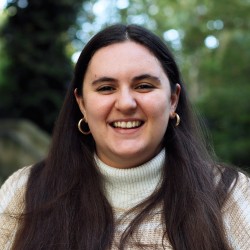
Dr Rosie Brett
Academic and research departments
Developmental Psychology Research Group, School of Psychology, Faculty of Health and Medical Sciences.About
My research project
Benevolent sexism in relation to the endorsement of heterosexual marriage traditions in children, adolescents and adultsI am interested in how heterosexual marriage traditions regarding surname changes, wedding days and proposals can be linked to benevolent sexism.
Supervisors
I am interested in how heterosexual marriage traditions regarding surname changes, wedding days and proposals can be linked to benevolent sexism.
Publications
Although lessons about sexism can increase gender egalitarianism in children, teachers often shy away from discussing sensitive topics, such as sexism, in classrooms. We conducted two studies to examine why teachers may not discuss sexism. In a qualitative study with 20 primary school teachers, teachers reported not discussing sexism because of the belief that sexism was not an issue, low comfort, and low knowledge levels in teaching sexism, that sexism was less important than other topics, and not enough support from parents and schools. Teachers taught about sexism to balance out other perspectives, when they had support from authorities, and when sexism was related to a lesson. Using the themes found in Study 1, Study 2 developed quantitative measures to examine the predictors of intentions to teach about sexism among 233 primary and secondary school teachers. The full model found that teachers had higher intentions to teach about sexism when they felt more comfortable and knowledgeable about teaching sexism and when teachers were younger. We discuss findings from both studies in terms of theoretical and practical implications.
Within most western countries, gendered proposal, surname, and wedding traditions remain widely endorsed. A previous study indicated that endorsement of proposal and surname traditions is associated with higher levels of benevolent sexism (BS) in university students in the USA. Three studies (N = 367) extended research to adolescents (dating age) and 30-year-olds (typical first-time marriage age). For the first time, these studies examined gendered wedding traditions (e.g., father walking a bride down the aisle). Different combinations of ambivalent sexism predicted participants' opinions about surname change after marriage and the choice of children's surnames. In younger adolescents (11-18; 56 boys, 88 girls, 68.1% White years), hostile sexism (HS) predicted endorsement of surname change, whereas benevolent sexism predicted endorsement in 16-to 18-year-olds (58 boys, 84 girls, 76.8% White) and 30-year-olds (37 men, 44 women, 74.1% White). In adolescent samples, both BS and HS predicted endorsement of patronymic traditions for children, whereas only BS did in the adult sample. The findings suggest that different types of sexism predict traditional beliefs in specific age groups.